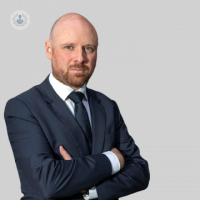Sports medicine: what’s the goal?
Written by:Sports medicine is a relatively new field in health, but what exactly does it do and who does it help? Globally-recognised, London-based football and sports medicine physician, Dr David Porter, explains how sports medicine aims, with the help of a multidisciplinary team of experts, to enhance sporting performance and reduce risk of injury in athletes and amateurs alike.

What is sports medicine?
Performing to the best of your ability is a priority for anyone involved in sport, whether professionally or leisurely. High-functioning joint mobility, a strong musculoskeletal system, and a strong cardiovascular system crucial to fitness levels all contribute to an athlete's capacity to perform. While sport can improve health, both mentally and physically, overexertion can often lead to injuries. The field of sports medicine advocates that by improving one’s mobility and fitness, one can reduce their risk of injury and maximise their performance.
How does sports medicine aim to reduce injury?
Sports medicine aims to combine the fields of exercise science and medical practice to ensure the prevention and optimal treatment of injuries, and begins by addressing the causes of the injury. Muscle weakness is a leading cause of sporting injury, which could be avoided by improving the strength of the muscles and the function of the joint. For example, the main cause of ACL injuries are quadricep and/ or hamstring muscle weakness. If these muscles were strengthened, the likelihood of an ACL injury decreases.
What specialists are involved in sports medicine?
A multidisciplinary team made up of physical therapists, nutritionists, and certified sports trainers, and led by a physician. By combining the skill set of each specialist, the sports medicine team will help patients return to sport safely.
What does sports medicine involve?
Sports medicine is comprised of a wide range of practices, from strength and conditioning to treatments like injections, rehabilitations, and osteopathic manipulation. Commonly treated injuries include fractured bones, tendonitis, dislocations, sprains, and, as mentioned before, ACL tears. Following an injury, sports medicine experts will work to ensure the injury doesn’t reoccur.
Is sports medicine only for professional athletes?
Many people who avail of sports medicine aren’t athletes but have sustained an injury from sport. Sports medicine offers patients a holistic approach and emphasises the importance of the physical activity to improve one’s overall wellbeing. It is scientifically proven that sport and physical exercise can have a major positive impact on an individual's health. Physical activity can greatly reduce the risk of developing the following conditions:
If you have experienced a sporting injury and would like to book a consultation with Dr David Porter, you can do so by visiting his Top Doctors profile.


